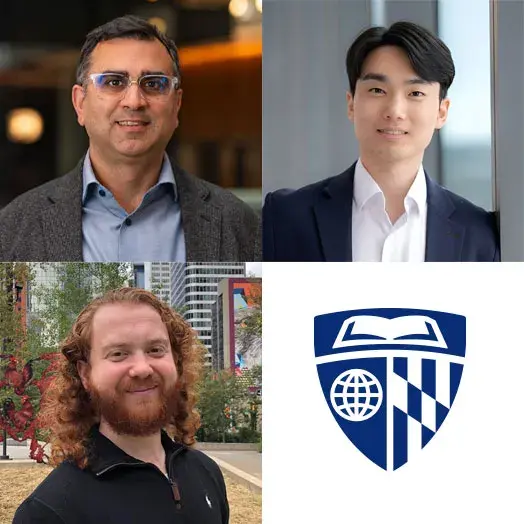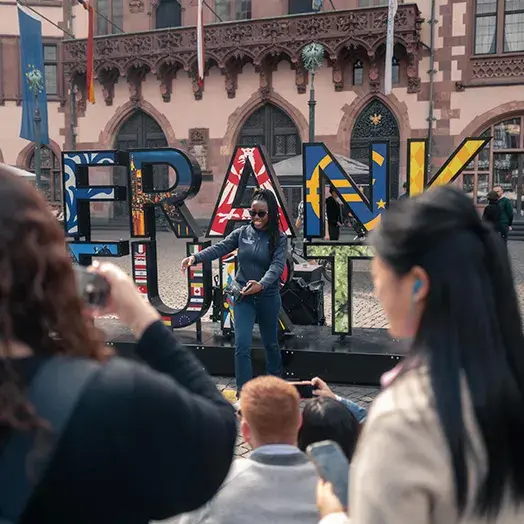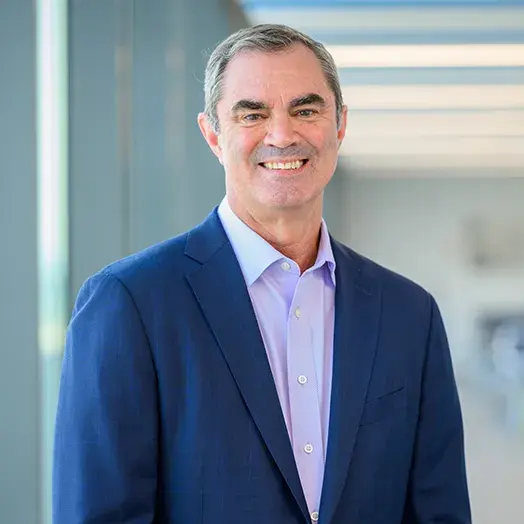The fourth annual Student Venture Showcase crystallized the business school experience by allowing six teams to compete for impressive funding for their businesses.
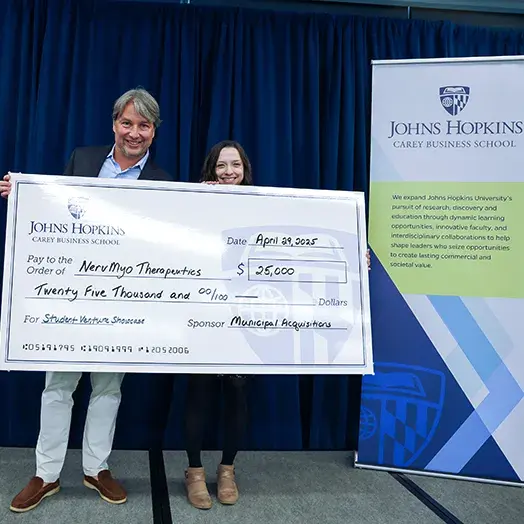
Promising nerve therapy startup wins a triple crown, and $34k, at Carey’s Student Venture Showcase
Erica Lee’s interest in nerve injuries has propelled her through a grueling combined PhD and MD program at the Johns Hopkins University School of Medicine and inspired her to start a business, NervMyo Therapeutics.
“Our nerves connect us to our world, but unfortunately, they are easy to injure,” she explained to a panel of judges during her presentation at the Johns Hopkins Carey Business School’s fourth annual Student Venture Showcase.
Damaged peripheral nerves are notoriously slow to regenerate. The solution, Lee proposed, is a long-acting injectable formulation for insulin-like growth factor 1, which spurs nerve and muscle growth, already shown to speed nerve repair in rats by 30% or more.
Lee developed the system for her doctoral project, and worked for more than a year with the Pava Marie LaPere Center for Entrepreneurship – the Johns Hopkins startup incubator – to hone her market plan and pitch for NervMyo Therapeutics.
And on April 29, she delivered that pitch at the Johns Hopkins Carey Business School’s signature student venture competition and won three separate prizes – the $25,000 grand prize sponsored by Jon Kling, a Carey alum and founder of Municipal Acquisitions; a $6,000 HopStone Award from HopStone Capital, a fund for Johns Hopkins entrepreneurs; and a $3,000 Audience Choice Award from the Carey Business School.
“I’m stunned,” Lee said, after posing for photos with three giant checks.
Second prize, and $5,000 from the Pava Center, went to computer science major Iris Gupta, founder and CEO of CounselAI, a product that uses artificial intelligence to improve the legal discovery process, creating a system, she said, that’s less expensive, easier to use, and not prone to human error.
A grand prize born of great stewardship
The Student Venture Showcase is unique among student venture competitions for both the size of its first-place prize and the fact that it is undiluted funding, meaning the investors have no expectation of any percentage of a return on the investment. Awardees can use the entirety of the prize money to grow their businesses, without giving a percentage away.
Referring to the $25,000 grand prize, showcase sponsor Jon Kling (Real Estate ‘04) says he gets as much out of the event as he gives.
“I get so much out of it by just seeing the enthusiasm and creativity of our students. And it's contagious,” he said. “It reminds me of the scrappiness and the creativity that I had to bring every day when launching my business. The commitment, the single focus on being successful, the elimination of negativity, all these things are really important to an early-stage idea or venture company. In addition to feeling like it's my passion, as an entrepreneur, it really kindles my fire.”
What to Read Next
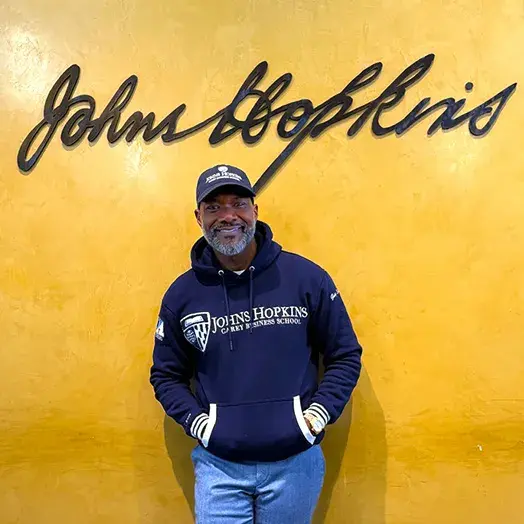
alumni success
Carey alumnus is turning heads and making gains with Gainz SportsgearA room full of inspiration
Six teams, all led by Johns Hopkins students, brought their entrepreneurial passion, their well-curated pitch decks, and their nervous energy to the daunting task of simply and compellingly explaining their businesses and why they would be good investments.
In addition to the winning participants, competing teams included:
- PinPoint DX, led by biomedical and biochemical engineering students Milun Jain, Viraaj Reddi, and Atharva Mulay, which aims to improve access to high-quality blood sampling;
- Deepnosis, created by Carey MBA student Hasti Jamshidi, which would give providers personalized information about the medication side effects their patients might experience;
- Fetal Therapy Technologies, launched by bioengineering master’s degree student Selena Shirkin, which offers a novel port system to enhance the safety and success of in-utero procedures;
- KaraOrchee, developed by Peabody Institute doctoral student Crystal Jiang, which creates a real-time AI-powered orchestra pieces to accompany musicians.
Each team had five minutes to make a pitch that explained its product and outlined a plan for bringing it to market. Then came eight minutes of questions from the panel of judges: Barbara White, founder and CEO, The Avoka Group; Supriya Munshaw, associate dean for academic programs at Carey and general partner of TCP Venture Capital; Margaret Roth, principal, Squadra Ventures; Neil Davis, partner, TCP Venture Capital; Teddy Gresser, director of Seed Funds, Tedco; and Jeff Spitz, founder and partner, 1891 Angel Investors, which supports Johns Hopkins startups.
Their questions were often about what set the team’s idea or product apart, how long it would take to get to market, what partnerships were being pursued, and how much money it would need before becoming a profitable business.
“This is one of my favorite days in the life of Carey,” said Alexander Triantis, dean of the Carey Business School. “It really celebrates the essence of the business school and our community.”
More than 100 people, mostly students, filled the seats in the top-floor room of the Carey Building to network, soak up inspiration, and support their fellow entrepreneurs.
“Everybody in this room is here to help you,” said last year’s winner, Asher Varon, a Ph.D. candidate in mechanical engineering and CEO of ViVE, a startup company for a medical device that detects opioid overdoses and administers naloxone. “They want to be active participants in what you are building. Lean into your mistakes. Lean into those forks in the road, and do it confidently knowing that everyone in this room is here to help.”
Going forward
Now in its fourth year, the competition seems to get fiercer with each iteration, several people at the event said. About 50 student teams - the most ever - from across Johns Hopkins submitted their pitches for just six slots, said Wendy Crowley, associate director of student innovations.
To qualify, applicants needed a fully developed pitch that included their value proposition, their target customers, and their revenue projections, said Annie Zhao, a member of VentureNest, the student-led business incubator group that worked with Crowley to screen the applicants and organize the event.
“We’ve been working with a lot of these teams for years,” said Josh Ambrose, director of the Pava Center, which provides startup support and grants ranging from $100 to $140,000. “It’s really fun to see them progress. Not every company will succeed, but I do believe in the founders. We invest in founders.”
Kling, the primary sponsor, told presenters that each idea was compelling and fundable, and encouraged them to embrace suggestions and change as needed. His own business, which acquires and develops properties for nonprofit organizations, was built from a plan he developed while in Carey’s MBA real estate program, he said. He didn’t pursue it, though, until four years after he graduated.
Amid the financial crisis of 2008, he explained, he pulled the idea out of a desk drawer, opened a bottle of wine, pulled an all-nighter, and taught himself how to make a website. From that inauspicious start, a successful business was born.
“Today I want to encourage those here to keep going forward,” said Kling, a member of Carey Business School’s Dean’s Advisory Council and the Johns Hopkins Real Estate and Infrastructure Advisory Board. “It’s worth the risk. Keep working it through. I promise you the rewards are significant, and that’s why I’m here today.”
